Odesa Law Academy continues to progress at an impressive pace, proving daily that it is a benchmark for the quality of education in the 21st-century Ukraine. The years 2004–2009 mark a new period in the University's life, namely, new achievements, new heights conquered, and new events that have become, without exaggeration, historic. Undoubtedly, one of the most significant milestones was the opening of Ukraine's first student church – the Church of Saint Martyr Tatiana, the patron saint of all students.
For four years, the construction of this unique church building continued, blending Orthodox architectural traditions with bold, innovative solutions that highlight the modern relevance of the church mission within the student community. On September 3, 2006, the Church of Saint Tatiana was consecrated. That day, the church premises and the surrounding area were filled with thousands of academy students and devout residents of Odesa who came to share in the joyous celebration. The staff, honoured guests, and hierarchs of the Ukrainian clergy attended the church's first liturgical service.
An important milestone in the history of Odesa Law Academy was the year 2004, when the university signed the Magna Charta Universitatum. Based on this document, along with the academy's membership in the Association of European Universities since 1998, the university gained the opportunity to join an exclusive circle of top educational institutions in Europe and the world. This allowed the university to participate in student exchange programs, welcome visiting professors, and engage in international academic collaborations.
The Magna Charta Universitatum establishes the fundamental values,
rights, and responsibilities of universities as key institutions of society. Their mission is to
define and disseminate essential principles and knowledge while providing intellectual guidance
to society. Additionally, since signing the charter, diplomas from Odesa National Law Academy
have been officially recognized across all European countries, including for employment
purposes.
It is worth noting that Odesa Law Academy is among the
first five higher education institutions in Ukraine to have signed the Magna Charta
Universitatum. The full list of universities that have signed the charter can be found here.

The Original Magna Charta Universitatum, which included Odesa State Law Academy in 1998. Preserved at the University of Bologna.
International cooperation plays a crucial role in the development and status of the University. During the 2006-2007 academic year, over 60 students, postgraduate researchers, and faculty members of the academy participated in study programs, internships, and conferences at leading universities in the United States, the United Kingdom, Canada, Spain, Italy, Poland, Germany, Belgium, Austria, and Greece – all funded by international organizations and foundations.
The total amount of grant aid received by academy staff exceeded 300,000 euros. Throughout the 2006-2007 academic year, foreign guests and delegations visited the academy almost every week. Among them were Paul Arni, Head of the Regional Delegation of the International Committee of the Red Cross, the General Prosecutors of Moldova and Romania, Philip Kirsch, President of the International Criminal Court, as well as other distinguished experts from the United States, the European Union, the United Kingdom, Austria, Turkey, Poland, Greece, Serbia, and Georgia. This active international engagement facilitated the optimization of contractual agreements and strengthened partnerships between the university and its foreign counterparts.
The University's infrastructural expansion continued without pause. In 2004, the Administrative Building of Odesa National Law Academy was inaugurated. Immediately after its completion, it became a true landmark of the institution and a symbol of legal education in Southern Ukraine.
The Administrative Building houses the modern Green Hall, which still
serves as the venue for meetings of the university highest governing bodies, including the
Academic Council and the Rectorate. It also hosts international conferences and other
significant university events. Additionally, the Administrative Building includes a forensic
laboratory, academic departments, such as Administrative and Financial Law and International and
European Law, Offices for the University administration, Various administrative departments.
Alongside
the Administrative Building, the ONLA Sports Complex was also inaugurated.
In 2006, the construction of ONLA 'Computer House' was completed. This educational building was equipped with state-of-the-art computer labs, designed to train students in working with government and judicial web portals, information systems, and legal research tools.
On the first floor of the 'Computer House', the largest Rare Book Museum among all Ukrainian universities was established. The museum housed a unique collection of 16th–17th century publications, including scientific, journalistic, theological, and literary works. A notable exhibit was the original 1623 edition of the New Testament.
Additionally, special attention should be given to the modern shooting range, covering 538.82 sq. m. The facility includes a 25-meter shooting range (156 sq. m) with a bulletproof partitioned firing line, an air rifle range equipped with sports-grade small-caliber pistols and rifles, and individual shooting stations, each fitted with a monitor transmitting data in real time to trainer workstations.
A key feature of the shooting range, and consequently of ONLA 'Computer House' building, is the Firearms and Cold Weapons Museum, which was inaugurated in May 2010 at the initiative of the university president, Sergiy Vasylovych Kivalov, to mark the 65th anniversary of the Ukrainian People's Victory in World War II.
Additionally, at 7 Pionerska Street (now Akademichna Street), the reconstruction of a new two-story lecture hall building for law students was completed. The building included lecture halls, each capable of accommodating more than 150 students.
In total, as of 2009, the university's academic facilities comprised more than 200 modern, spacious lecture halls, classrooms, auxiliary and specialized study rooms, approximately 7,600 seats for lectures, seminars, and practical sessions, as well as over 20 specialized computer labs with 475 workstations.
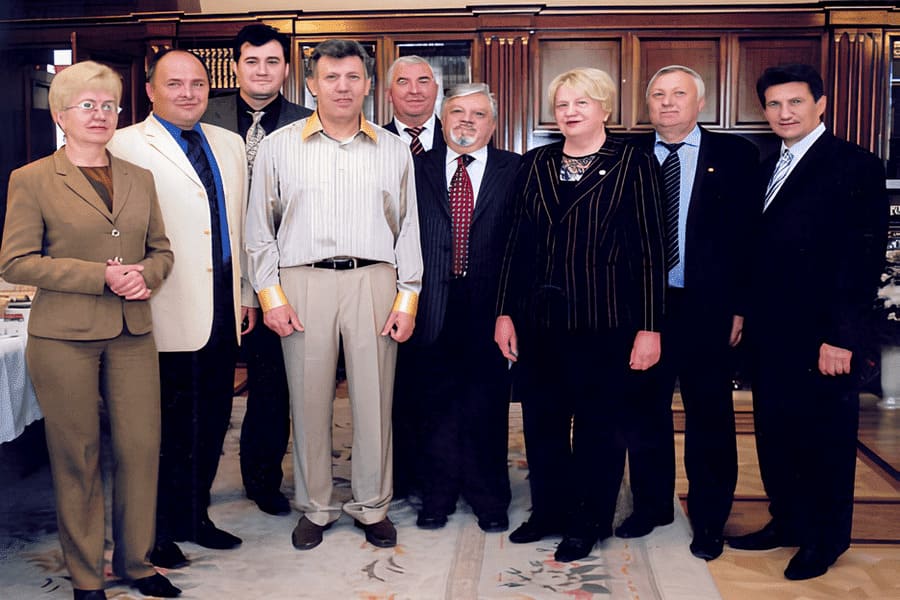
President of Odesa National Law Academy, Sergiy Kivalov, together with the staff of the Institute of Prosecution and Investigation.
Keeping pace with the rapid development of its material and technical facilities, the scientific and educational activities of Odesa National Law Academy also advanced. In 2005, as part of the deepening specialization of legal education professionals, the Judicial and Prosecutorial Faculty was reorganized into the Institute of Prosecution and Investigation.
Within just two years, the Institute of Prosecution and Investigation became the most prestigious structural unit of the Law Academy. In the 2007-2008 academic year, 270 first-year students were admitted to the full-time program, including 165 students enrolled under the state order of the General Prosecutor's Office of Ukraine (through targeted referrals from prosecutor's offices in almost all regions of Ukraine). The institute housed six departments such as the Department of Criminal Procedure, the Department of Criminal Law, the Department of Criminalistics, the Department of Criminology and Penal Law, the Department of Social Theories, and the Department of Physical Education.
In October 2005, the Faculty of Civil and Economic Justice was established on the basis of the Faculty of Justice and Legal Work in the National Economy. This faculty is justifiably considered the successor to the Department of Civil Law, Civil Judiciary, and Legal Proceedings of the Imperial University, founded back in 1865. At this faculty, students studied civil law, civil procedure, legal support of business activities, legal regulation of foreign economic activity, land ownership relations, and other related subjects.
The faculty housed some of the oldest and most prestigious departments, including the Department of Civil Law, the Department of Civil Procedure, the Department of Agrarian, Land, and Environmental Law, and the Department of Business and Commercial Law.
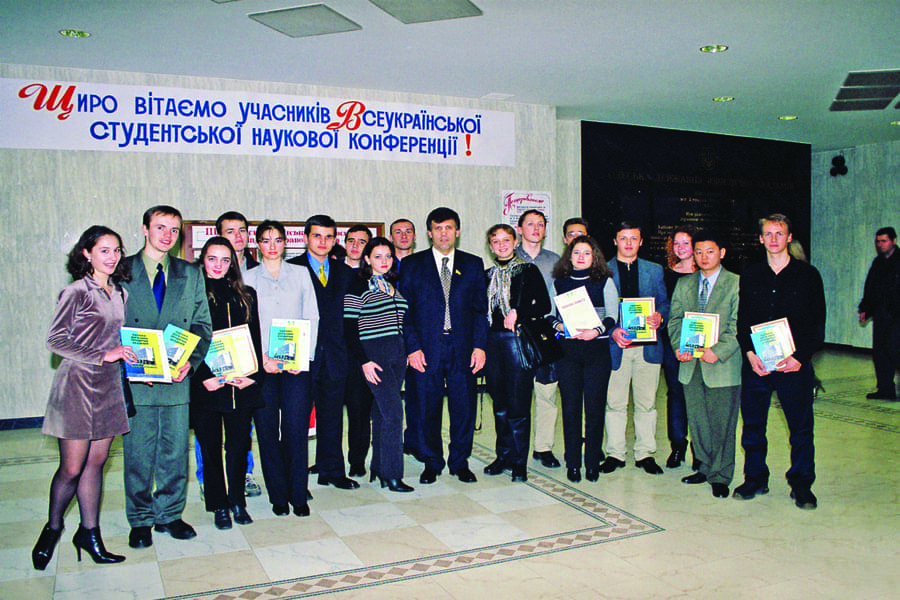
2003 – President of Odesa National Law Academy, Serhgiy Kivalov, and students at one of the first All-Ukrainian scientific conferences.
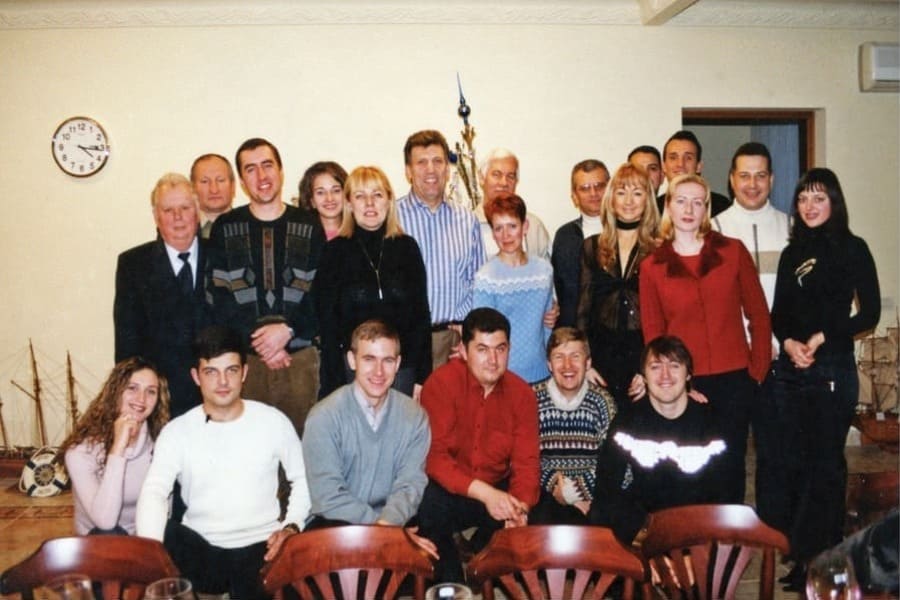
Staff of the Department of Administrative and Financial Law of Odesa National Law Academy.
To enhance the quality of training for professionals working in the judiciary, executive authorities, local self-government, the State Judicial Administration, the State Enforcement Service, law enforcement agencies (the Security Service of Ukraine, the State Customs Service, the Prosecutor's Office, and the police at that time), legal departments of organizations and enterprises in the maritime industry, as well as in public human rights organizations, the Judicial and Administrative Faculty was established in October 2005. This faculty included within its structure the Department of Administrative and Financial Law, the Department of Constitutional Law, and the Department of Organization of Judicial and Law Enforcement Agencies.
Considering the exceptionally active international engagement of Odesa Law Academy and Ukraine's significant need for specialists in international and European law, the youngest faculty – the Faculty of International Legal Relations and Journalism – was established in 2005. This faculty included the Department of European Union Law and Comparative Law, the Department of International Law and International Legal Relations, the Department of Foreign Languages, and the Department of Legal Psychology and Pedagogy.
Additionally, the Social and Legal Faculty continued its working. Established in 2002, this faculty enrolled students directed by regional offices of Ukraine's Pension Fund from all regions of the country and the Autonomous Republic of Crimea, as well as by the Main Directorate of Labor and Social Policy of Odesa Regional State Administration. The faculty housed the Department of Labor Law and Social Security, the Department of National Economy, and the modern Department of Legal Informatics.
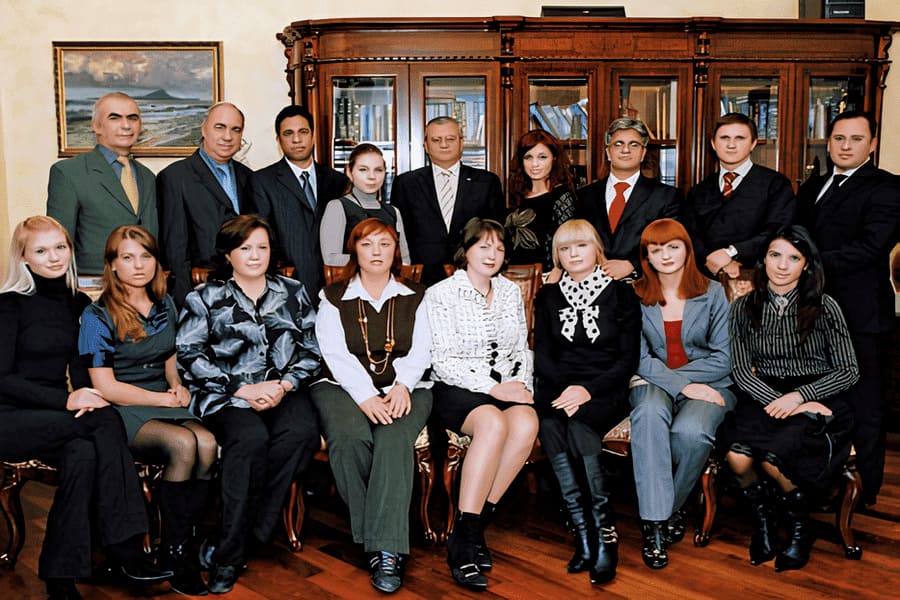
Academic staff of the Faculty of International Legal Relations and Journalism.
In October 2005, the Faculty of Advocacy was also established, offering specialization in 'Advocacy Practice'. This faculty provided training on both state-funded and commercial bases for future legal professionals, aiming to provide qualified personnel to bar associations, law firms, various institutions, enterprises, and organizations. Its primary goal was to enhance the quality of legal assistance provided to citizens. The faculty served as the academic base for several departments, including the Department of Theory of State and Law, the Department of History of State and Law, and the Department of Philosophy.
Additionally, the Master's Program in Public Administration at Odesa National Law Academy, established in 1996, experienced significant development. Its main objective was to get ready specialists who, based on their prior qualifications, acquired advanced, innovative knowledge and practical skills. These professionals gained experience in applying and generating new knowledge to solve complex professional tasks in various sectors of the economy. The foundation for this structural unit was the signing of a General Agreement between ONLA and the Main Department of Civil Service of Ukraine.
Furthermore, the academy long maintained the First and Second Distance Learning Faculties, allowing students to obtain their first and second legal education degrees remotely.
As Odesa National Law Academy rapidly gained recognition as one of the leading educational institutions in Odesa and later across Ukraine, it increasingly welcomed distinguished guests on official visits. These visits often resulted in the signing of cooperation memorandums, the establishment of internship programs, and even the creation of new structural divisions and academic specializations.
During this period, ONLA was visited by Alistair Alcock, Dean of the Law School and Vice-Chancellor of the University of Buckingham (UK) (May 7, 1999); Vitalii Fedorovych Boiko, Chief Justice of the Supreme Court of Ukraine (July 3, 2000); Dmytro Mykytovych Prytyka, Chairman of the Higher Arbitration Court of Ukraine (July 3, 2000); Mykhailo Oleksiiovych Potebenko, Prosecutor General of Ukraine (October 25, 2000); Nikola Filchev, Prosecutor General of the Republic of Bulgaria (June 2, 2001); Vasyl Tymofiiovych Maliarenko, Chief Justice of the Supreme Court of Ukraine (November 30, 2002); Lucius Conrad Caflisch, Judge of the European Court of Human Rights (May 30, 2003); Philippe Kirsch, President of the International Criminal Court (February 2, 2006); Ivan Petrovych Dombrovskyi, Chief Justice of the Constitutional Court of Ukraine (February 2, 2007); Oleksandr Ivanovych Medvedko, Prosecutor General of Ukraine, as well as local government officials and regional judicial authorities.
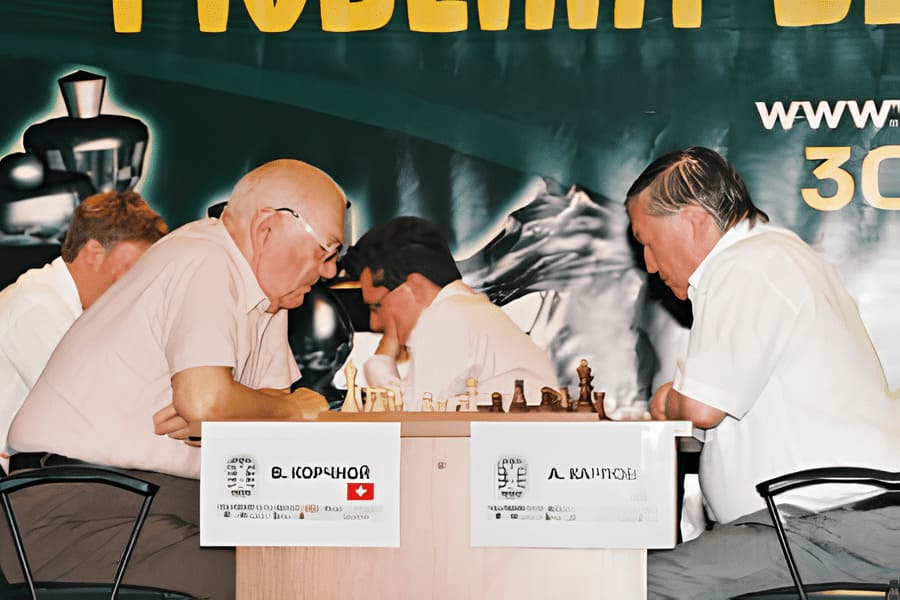
As a result of the synergistic combination of a well-developed material and technical facilities and a highly specialized educational and scientific system, in 2006 and 2007, Odesa National Law Academy was rightfully recognized by the Council of Rectors of Higher Educational Institutions of Odesa region as the best university in Southern Ukraine.
As a result of the synergistic combination of a well-developed material and technical facilities with a highly specialized educational and scientific system, Odesa National Law Academy was rightfully recognized as the Best University of Southern Ukraine by the Council of Rectors of Higher Educational Institutions of Odesa region in both 2006 and 2007.
Furthermore, Odesa National Law Academy serves as a hub for scientific and student conferences, as well as international sports events. In 2007, the Academy hosted a stage of the World Rapid Chess Cup. The best chess players competed in the Academy's assembly hall, marking a historic event in the world of chess – the long-awaited reunion match between legendary grandmasters Anatoly Karpov and Viktor Korchnoi after many years apart. The walls of Odesa National Law Academy bore witness to this remarkable moment in chess history.